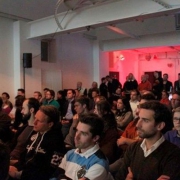Despite all the political shifts and changes in the US, Silicon Valley will continue to lead. China is following very fast. And the rest of the world looks no longer only to Silicon Valley but also to China – with only little attempt to compete.
The gap remains to be wide
We participated in pitch events and organized our first “Innovation Development & Innovative Thinking” workshop. We had an opportunity to speak with startups from German, Switzerland, France, India, Mexico, and a few other countries who were here as guests. Most came here as winners from foreign pitch events, sponsored by their countries. The difference is as big as it was 5, 10 or 20 years ago. Those teams come here with their very low key and entirely product focused pitches. There is still no word about the business model, go-to-market strategy, and their early successes so far. Well yes, there are no early successes because most work in isolation and only speak to customers when they are really forced to.
Selling your startups to the US
To the contrary, Silicon Valley based startups come with bold plans for the future and are determined to make a difference, pushing hard towards an IPO. Startups from the rest of the world come with an exit strategy without even having begun to grow their business. And if the discussion comes to selling the business they have no answer than selling it quickly – and those who make it to some revenue actually do so. Just think about it. If Carl Benz, Robert Bosch, Alfred Escher or Steve Jobs would have sold their company for a few million or so to Russian enterprises; Germany, Switzerland or even the US would be less wealthy or poor, like in the past and Russia would be a premier industry nation.
Cultural Reflections
Silicon Valley still holds the pole position as the most advanced human business and entrepreneurial or innovative culture. When we look at Chinese businesses, from startups to global enterprises, we literally feel an unparalleled transformation of their culture here too. Only comparable with Silicon Valley, everything is possible. And it starts at the very top: one belt, one road or Belt & Road Initiative, is for the world today, what was going to the moon in the 1960’s. Startups quickly emulated the big thinking, everything is possible. Even though we don’t see groundbreaking innovations yet – we will. And with that transition we see multi billion $ startups from China as well. The rest of the world continues to argue with jealously or huge admiration. But no real attempt to work on their respective cultures.
Technological advancement
The biggest data concentration is now balanced between California with Amazon, Google, Netflix and Microsoft, quickly followed by some 20+ other giants on one side and Baidu, Tencent and Telco and banking systems in China. Building a European Search Engine never happened and the data protection effort in Europe played all advantages perfectly in the hands of China and the US. If one would like to put up a conspiracy strategy, it is maybe that somebody influenced the EU in a way to protect everything to a degree that there is one day nothing to protect anymore. Digital warfare at its absolute best. And it is not only on the digital side – but now enters the automobile industry.
Automobile Industry advances
It’s amazing to see how fast US car makers began to learn as their cars got more and more connected. Data is shared with the car makers so they can learn from driver behavior and accidents. In Europe that would be unthinkable. Its all about protection and not about learning. We learned there are roughly 500 autonomous cars in San Francisco. There are now companies who perform these test drives. All the learning and knowledge is aggregated in Silicon Valley – again. Testing those cars in Europe is prohibited. And since European businesses are all about bar bone technology and not customer experience, they are doomed to fall much further behind. Yes, the order books in Europe are full – but how long?
Mobile Connections
Just 3 years ago we were still arguing about the mobile connection in the US. Boooom that has changed. I no longer used Wifi during our entire 4 week stay. We used our local phones and tethered with our laptop because it was the fastest. 4G is fast. In Europe, only Switzerland can keep up with the US when it comes to online connections.

 Africa, most of South East Asia and Latin America has showed phenomenal progress in education already; having 1,000 times more academic graduates than 50 years ago. There are now thousands of Universities across those continents, which created millions of well trained people – but with no equivalent job. What would a math degree do if you can’t work with it? Today there are more than a million graduates in in each of the three continents. The best they can do would be try to get to Europe or the US. Yet – that would be a devastating brain drain and remove all hopes, those nations have today. Before the inception of development aid, education was a function of having better employees to handle the jobs – but here we have better education but no jobs. We realized we needed to find out how exactly did developed countries develop.
Africa, most of South East Asia and Latin America has showed phenomenal progress in education already; having 1,000 times more academic graduates than 50 years ago. There are now thousands of Universities across those continents, which created millions of well trained people – but with no equivalent job. What would a math degree do if you can’t work with it? Today there are more than a million graduates in in each of the three continents. The best they can do would be try to get to Europe or the US. Yet – that would be a devastating brain drain and remove all hopes, those nations have today. Before the inception of development aid, education was a function of having better employees to handle the jobs – but here we have better education but no jobs. We realized we needed to find out how exactly did developed countries develop. In the early and mid 1800’s, Switzerland was the poorest country in Europe. Germany was a poor country, South Korea was one of the poorest countries in Asia, California was a desert and the most western farmland in the US. If not for the Gold, California would hardly be on the map. Yet the natural resources died out quickly. A similar risk the Arabian peninsula is facing. However something changed above and beyond natural resources and tourism: Innovation and entrepreneurship. When Carl Benz, Robert Bosch, Werner v. Siemens and Friedrich Krupp, crazy entrepreneurs with useless ideas, started to engineer, develop, produce, market, sell and scale their businesses, Germany became a wealthy nation. There is nothing else that propelled the German economy as much as these crazy entrepreneurs. At the same time period, Alfred Escher wanted to build a railroad in Switzerland. But since this was a low priority for the very poor Swiss population, he could not raise any capital. So he asked for foreign investment, the sheer amount he raised, required him to create a more international bank, Credit Suisse. Since he needed more talent, he created the Zürich based University, ETH, today one of the most renowned Tech Universities in the world. Did you know the jet engine was invented in France? Now you know why France is still one of the world’s leading aerospace nations. Did you know that Silicon Valley was essentially based on five entrepreneurs? Almost all developed countries started poor, had an environment where crazy entrepreneurs just could do their thing, no matter how useless and money could flow in from foreign investors. The US, Germany, Switzerland, South Korea, Japan, and all others have been based on that very principle. Thousands of years before that it was war, theft and the financing of their armies to do the very same: invent, grow, sell and come to prosperity. Since thousands of years, the nations that carried their goods in foreign countries and received investment from foreign countries rose. And there is no reason to continue that path with an ever larger number of nations. We never tried to answer the question, how can we get 3.5 Billion people out of poverty with the help from the West? We wanted to know what made the developed countries so prosperous and if we could apply that learning to eradicate poverty.
In the early and mid 1800’s, Switzerland was the poorest country in Europe. Germany was a poor country, South Korea was one of the poorest countries in Asia, California was a desert and the most western farmland in the US. If not for the Gold, California would hardly be on the map. Yet the natural resources died out quickly. A similar risk the Arabian peninsula is facing. However something changed above and beyond natural resources and tourism: Innovation and entrepreneurship. When Carl Benz, Robert Bosch, Werner v. Siemens and Friedrich Krupp, crazy entrepreneurs with useless ideas, started to engineer, develop, produce, market, sell and scale their businesses, Germany became a wealthy nation. There is nothing else that propelled the German economy as much as these crazy entrepreneurs. At the same time period, Alfred Escher wanted to build a railroad in Switzerland. But since this was a low priority for the very poor Swiss population, he could not raise any capital. So he asked for foreign investment, the sheer amount he raised, required him to create a more international bank, Credit Suisse. Since he needed more talent, he created the Zürich based University, ETH, today one of the most renowned Tech Universities in the world. Did you know the jet engine was invented in France? Now you know why France is still one of the world’s leading aerospace nations. Did you know that Silicon Valley was essentially based on five entrepreneurs? Almost all developed countries started poor, had an environment where crazy entrepreneurs just could do their thing, no matter how useless and money could flow in from foreign investors. The US, Germany, Switzerland, South Korea, Japan, and all others have been based on that very principle. Thousands of years before that it was war, theft and the financing of their armies to do the very same: invent, grow, sell and come to prosperity. Since thousands of years, the nations that carried their goods in foreign countries and received investment from foreign countries rose. And there is no reason to continue that path with an ever larger number of nations. We never tried to answer the question, how can we get 3.5 Billion people out of poverty with the help from the West? We wanted to know what made the developed countries so prosperous and if we could apply that learning to eradicate poverty. We realized that nearly all developed countries, on three different continents rose to prosperity through innovation and entrepreneurship. Moreover, in understanding that entrepreneurship is not a western ‘invention’ but a universally applicable concept, for thousands of years across all cultures. We began to look for such entrepreneurs in developing and emerging countries. And we found jar dropping entrepreneurs and their startups in Argentina, Ghana, Nigeria, Peru, Vietnam and many other countries. With those results, we decided to turn economic development towards a direction that was probably not very well understood before: innovation and entrepreneurship.
We realized that nearly all developed countries, on three different continents rose to prosperity through innovation and entrepreneurship. Moreover, in understanding that entrepreneurship is not a western ‘invention’ but a universally applicable concept, for thousands of years across all cultures. We began to look for such entrepreneurs in developing and emerging countries. And we found jar dropping entrepreneurs and their startups in Argentina, Ghana, Nigeria, Peru, Vietnam and many other countries. With those results, we decided to turn economic development towards a direction that was probably not very well understood before: innovation and entrepreneurship.